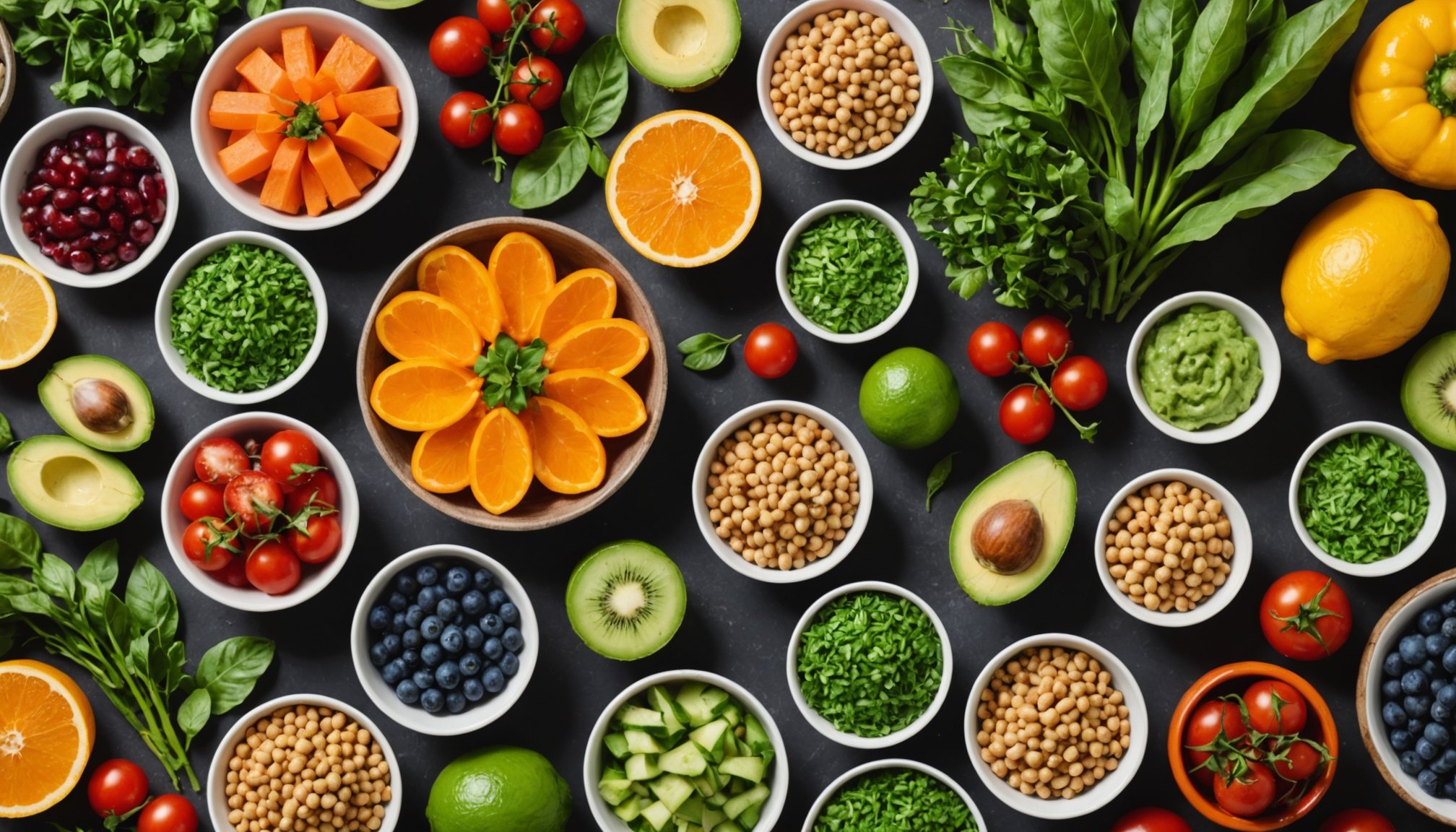Understanding Plant-Based Living
A plant-based lifestyle centres around consuming primarily plant-derived foods while reducing or eliminating animal products. This approach emphasises fruits, vegetables, whole grains, nuts, and seeds. The core principle is to improve overall well-being while considering environmental sustainability.
Health Benefits
The health benefits of transitioning to a plant-based diet are profound. Studies consistently show a reduced risk of chronic diseases such as heart disease, diabetes, and certain cancers. Plant-based diets are often rich in fibre, vitamins, and antioxidants, which contribute to improved digestion and increased energy levels. Additionally, they typically contain less saturated fat, potentially aiding in weight management.
Also to discover : Revolutionizing PTSD Recovery: How Narrative Therapy Heals Veterans’ Hidden Wounds
Environmental Impact
Beyond personal health, a plant-based lifestyle significantly impacts the environment positively. It requires fewer natural resources, such as water and land, compared to animal farming. This reduction leads to a smaller carbon footprint and decreased greenhouse gas emissions. By opting for plant-based living, individuals contribute to a more sustainable future.
Incorporating plant-based living into your daily routine can enhance your health while actively participating in environmental conservation. With its holistic benefits, understanding and embracing this lifestyle extends beyond personal gain, offering a meaningful contribution to global sustainability efforts.
Also to discover : Unlocking the Potential and Overcoming Hurdles of AI in Elderly Care: Key Insights for Future Transformation
Essential Tips for Transitioning
Moving towards a plant-based lifestyle can seem daunting at first, but simple steps ensure a smoother journey. Begin by gradually incorporating more plant-based meals into your diet. This slow transition allows you to adapt your taste buds and lifestyle to new health benefits seamlessly.
Start by modifying recipes you already love. For instance, try swapping regular pasta with a whole-grain or lentil-based option, or replace meat with beans or mushrooms in your favourite dishes. Familiarity in meals eases the transition without feeling deprived.
Meal prepping is another strategic approach to adapt this new lifestyle. Preparing meals in advance saves time, reduces stress, and ensures you have healthy, plant-based options readily available during busy weeknights. Dedicate a few hours weekly to plan, shop, and prep your meals.
Finally, remember that transitioning isn’t about perfection but progression. If cravings for animal products arise, acknowledge cravings without self-criticism. Environmental impact and health improvement are long-term goals worth the gradual shifts. Embrace your journey with patience and creativity, and soon, plant-based living can become an enriching aspect of your life.
Beginner-Friendly Recipes
Exploring plant-based recipes can be an enjoyable and satisfying journey, especially for those new to this lifestyle. Here are beginner-friendly options to ease the transition.
Quick Breakfast Ideas
Start your day with energising easy meals. Consider overnight oats: simply soak oats in a plant-based milk, like almond or oat, with seeds and fruit. Chia puddings are another nutritious option; mix chia seeds with coconut milk and let them sit overnight for a protein-packed breakfast.
Simple Lunch Options
Preparing lunch meals requires minimal effort. Try a vibrant quinoa salad. Mix cooked quinoa with diced cucumbers, cherry tomatoes, and avocado. Add a squeeze of lime juice for freshness. Alternatively, a whole grain wrap filled with hummus, spinach, and roasted vegetables makes for a tasty meal.
Convenient Dinner Recipes
Hearty dinner recipes don’t have to be complicated. A one-pot lentil stew with carrots and potatoes is comforting and flavourful. For something quick, consider a stir-fry with tofu and an array of colourful vegetables. Add soy sauce and ginger for an Asian-inspired twist.
Engaging with these options allows beginners to experiment without feeling overwhelmed. Over time, such explorations can enrich one’s repertoire of delicious plant-based meals.
Shopping Guide for Plant-Based Staples
Embarking on a plant-based lifestyle involves smart shopping choices. Stocking up on essential pantry items is crucial. Look for staples like whole grains (quinoa, brown rice), legumes (lentils, chickpeas), nuts, seeds (chia, flaxseed), and a variety of herbs and spices. These ingredients form the foundation of diverse, nutritious meals.
When navigating grocery aisles, scrutinise product labels to avoid hidden animal products. Common culprits include gelatin, casein, and certain additives derived from animals. Familiarising yourself with plant-based certifications can simplify the process.
Budgeting is often a concern for many attempting a plant-based diet. Here are strategic tips:
- Purchase bulk items like grains and beans to cut costs.
- Plan meals ahead to reduce impulse buying.
- Seasonal produce is usually cheaper and offers vibrant, fresh flavours.
Exploring local markets can provide fresher and often more affordable plant-based options. Engaging with local vendors might also offer insights into sourcing the best staple ingredients. Remember, transitioning to a plant-based diet doesn’t require expensive specialty items. With careful planning and selection, creating a cost-effective, plant-based pantry is entirely achievable.
Meal Planning Strategies
Embracing a plant-based lifestyle involves strategic meal planning to ensure nutritious and satisfying meals throughout the week. Creating a weekly menu can significantly ease daily decision-making, helping individuals maintain consistency and variety in their diet. Crafting a detailed menu allows for balanced meal formation, ensuring all necessary nutrients are included.
Batch cooking emerges as a time-saving technique. By preparing large quantities of food, dividing them into portions, and storing them for later use, individuals can enjoy quick, nutritious meals without daily hassle. Hearty soups, stews, and grain dishes make excellent batch-cooking candidates.
Adjusting meal plans based on seasonal produce introduces freshness and affordability. Seasonal ingredients are typically more nutritious and flavourful, offering varied taste profiles while reducing costs. Thus, meal plans should reflect the abundance of each season, ensuring optimal nutrient intake.
By incorporating these strategies, an adaptable and efficient meal planning system forms, accommodating the needs and preferences of a plant-based diet. Utilising a rotating selection of meals from a pre-set menu allows flexibility and creativity, making the transition smoother and more enjoyable. This organised approach supports a wholesome and balanced plant-based lifestyle.
Motivational Advice and Testimonials
Embarking on a plant-based lifestyle can be transformative, and engaging with others can amplify this experience. Hearing success stories from individuals who’ve made the transition can be incredibly motivating. These stories reveal relatable challenges and triumphs, inspiring others to persevere in their own journey.
Being part of a community offers not only support but also shared knowledge and resources. Joining plant-based groups—either local or online—can provide encouragement and a sense of belonging. Here, individuals can exchange recipes, tips, and advice, aiding in overcoming hurdles faced during the transition.
Staying inspired involves surrounding oneself with like-minded people pursuing similar goals. Visualise your reasons for adopting this lifestyle; whether for health, environmental impact, or ethical beliefs, keeping these motivations at the forefront can sustain commitment. It is beneficial to celebrate small victories, acknowledging progress along the way.
Accessing shared resources ensures ongoing education and engagement. These connections foster a nurturing environment where aspirations become achievable realities. Crafting a supportive network not only enriches your plant-based journey but also provides long-term benefits that go beyond dietary changes, enriching overall life experiences.
Common Pitfalls and How to Avoid Them
Transitioning to a plant-based lifestyle presents several challenges, but they can be managed with the right strategies. Beginners often experience cravings for animal products, making them feel overwhelmed. Acknowledging these cravings without guilt can help. Substituting animal products with plant-based alternatives, like tofu or tempeh, provides familiar textures and flavours.
Addressing nutritional deficiencies is another concern when adopting a plant-based diet. Key nutrients to monitor include Vitamin B12, iron, calcium, and omega-3 fatty acids. To ensure a balanced diet, incorporate a variety of foods such as leafy greens, nuts, and fortified plant milks. Consulting a nutritionist for personalised nutrition advice can be beneficial.
Staying motivated is crucial for long-term commitment. Visualising personal goals, whether for health improvements or environmental contributions, can sustain an individual’s dedication. Create milestones to celebrate small victories, helping to maintain a positive outlook.
Additionally, beginner challenges like meal diversity can lead to monotony. Experimentation with new recipes and cuisines ensures variety and excitement. Connecting with plant-based communities offers opportunities to share ideas and overcome common barriers together, enhancing the overall experience.
Visual Aids and Resources
The journey to a plant-based lifestyle becomes more manageable with effective tools, such as infographics and visual aids. Using these resources can simplify complex information, making it accessible and easier to digest. Infographics are engaging ways to convey nutritional content, meal preparation steps, and the environmental benefits of plant-based diets.
Creating Checklists
One invaluable resource is the development of checklists. These are particularly useful for meal prepping and grocery shopping. A checklist can ensure you remember essential pantry items, like legumes, whole grains, and seeds, while navigating the grocery store. Consider dividing your checklist into sections such as fresh produce, grains, and condiments for a streamlined shopping experience.
Connecting with Resources
Beyond physical resources, tapping into digital useful guides provides ongoing support. Various online platforms offer guides crafted by experts, featuring meal plans, grocery lists, and nutritional information tailored to plant-based living.
Utilising infographics, checklists, and guides maximises efficiency and supports individuals in maintaining a balanced and fulfilling plant-based diet. These resources ensure that beginners have the necessary tools to make informed, confident decisions on their plant-based journey.
Nutritional Information
When adopting a plant-based lifestyle, understanding your nutritional needs is crucial. Focusing on key nutrients ensures you maintain a balanced diet. Protein is a primary concern, as many assume plant diets lack adequate amounts. However, sources like lentils, chickpeas, and quinoa provide ample protein. Balancing your intake of macronutrients, such as proteins, fats, and carbohydrates, is essential for optimal health.
Another critical aspect is ensuring sufficient plant-based nutrients like Vitamin B12, iron, and omega-3 fatty acids. Since Vitamin B12 isn’t naturally found in plants, fortified foods or supplements may be necessary. Iron from plant sources, such as spinach and lentils, should be paired with Vitamin C-rich foods to enhance absorption. Walnuts and flaxseeds are excellent sources of plant-based omega-3s.
While plant-based diets can provide many nutrients, supplements might help beginners fill gaps. Consider a B12 supplement, as its deficiency can lead to fatigue. If unsure about your nutrient intake, consulting a nutritionist can offer personalized guidance. By focusing on essential nutrients, a plant-based diet can be both nourishing and healthful, supporting your overall well-being.






